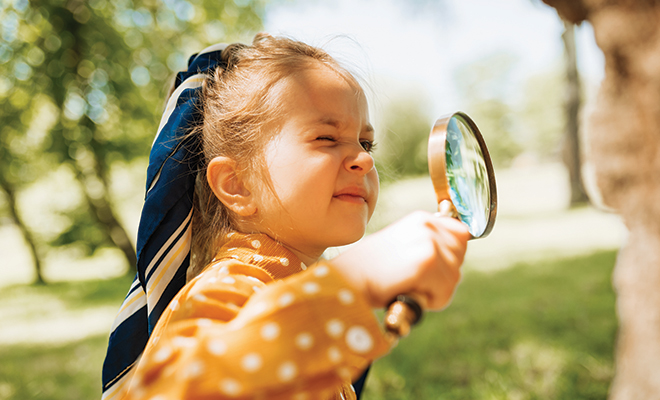
Nurturing Your Child’s Innate Curiosity: A Labor of Love
Developing your child’s natural curiosity about the world, other people, their lives and current events will broaden their thought process and encourage open mindedness.
When babies are born, their tiny souls begin to absorb the world around them, the new air they are breathing, the music they hear, the milk they drink and the colors of life. They are born as sponges and as moms we provide the environment they soak up. In a sense, they are born with basic, natural curiosity about everything!
Some studies show that curious personalities are associated with humor, playfulness, life satisfaction, good relationships and open-mindedness. Not surprisingly, curiosity also encourages life-long learning. Another important reason to encourage curiosity is that it is deeply intertwined with kindness and empathy.
There are many ways to do this, and a big tip is to teach your child how to observe the world around them. A simple “I wonder…” will encourage your kids to get into the habit of noticing both the big picture and the small details, helping curiosity take root. For example, you could say, “I wonder why that person is using a cane,” then discuss their thoughts. Is it because he or she is old, has a broken foot or another reason. Then share empathy for that person.
When you see a couple holding hands, discuss what that means. Take the tablet or phone out of your child’s hands and have them count the people they see holding hands and discuss each pair they see. Also, play the classic game of what’s different between two pictures, two people or two cars.
Mary Isaminger, a mom of three who has a bachelor of science in early childhood and elementary education from Samford University, Birmingham, Alabama, is a first-grade teacher who puts emphasis on instilling curiosity in her students and her own children. “I have been teaching for 19 years, and I am a firm believer that children learn best through their experiences. It’s also a good idea to give them a chance to fail so they can try again,” she noted. “I love the STEAM concept, which is Science Technology Engineering Art and Math. Children today have it harder because of so much technology, which tends to be a babysitter. I find that if I give my four-year-old an iPad, he will sit there and watch that. If I give him a box of Legos, he will sit there and build. I also believe in exposing kids to diversity through literature, including biracial marriage, two moms or two dads. Our world is changing and if children are taught to be accepting, they will be better humans.”
She advises parents to talk with their child about how curiosity actually works in the world, and how it impacts our world in areas ranging from government to education to medicine and more. Explain how things we use every day, such as light bulbs, cars and computers, were developed because of someone’s curiosity. Check out books about inventors such as Thomas Edison or look up Internet articles on other inventors.
Lack of curiosity often leads to stereotyping and more rigid thinking. Together, discuss how you can go beyond your first impression of a person or situation, and not go with a first reaction. Monkey see, monkey do applies here! Share your excitement about some of our world’s mysteries and challenges. Let your children know that different people have different opinions about issues and be curious to hear family members express their own thoughts.
A neat way to give kids an opportunity for intensified curiosity is to volunteer together at places such as a care facility or share a meal with people at a homeless shelter. Use these experiences to show how to expand their understanding of the experiences people have in different situations. This also encourages empathy for others. The book “I Wonder” by Annaka Harris is a celebration of life’s mysteries and a good one to help spark discussions about curiosity and awe.
Curiosity is a powerful contributor to high achievement as well as a the development of a fulfilling existence. Defined as the recognition, pursuit and intense desire to explore novel, challenging and uncertain events, it has been linked to happiness, creativity, satisfying intimate relationships, increased personal growth after traumatic experiences and finding meaning in life. A hungry mind is directly related to higher IQ.
Teachers today realize this and take different approaches in the classroom to encourage free thinking and open discussion about who is president, news events and popular movies. At home, you can take the lead and assure that your children continue to look outside themselves for understanding, love of others and a zest for life. ■
Sources: howtolearn.com, doinggoodtogether.org and theatlantic.com.







